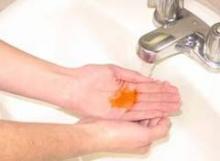The Food and Drug Administration is proposing that manufacturers of antibacterial soaps prove by 2016 that the products are safe and effective, or they must be reformulated or relabeled.
The agency said it currently is looking only at consumer products. It will address antibacterial soaps used in the health care and food preparation settings separately. The proposal also does not affect alcohol-based hand sanitizers, which the agency has already recognized as generally safe and effective.
The Dec. 16 proposed rule is the result of a settlement with the Natural Resources Defense Council (NRDC). That nonprofit environmental group sued the agency in 2010 to force it to issue a final rule on a 1978 proposal to remove the antibacterial agent triclosan from certain consumer products.
The FDA now says that manufacturers will have to prove that antibacterial soaps and body washes – primarily made with triclosan and triclocarban – are safer and more effective than soap and water in preventing infection and the spread of germs. The agency estimates that at least 2,200 antibacterial soaps are on the market. Manufacturers have provided no evidence supporting their use, Dr. Sandra Kweder, deputy director of the Office of New Drugs at the FDA’s Center for Drug Evaluation and Research, said in a call with reporters. Those manufacturers will now be required to conduct studies to prove safety and effectiveness in humans.
There has been evidence in animal and in vitro studies that triclosan and triclocarban are endocrine disruptors, Dr. Kweder said.
With the antibacterial soaps, "there are unknowns and even a slight potential for a risk," she said. "We think consumers ought to know, and we ought to know, what the benefits of these products are."
The rule is open for comment until June 2014. The antibacterial soaps are allowed to remain on the market until the agency finalizes its proposal – not likely until September 2016, Dr. Kweder said. If manufacturers cannot demonstrate safety and effectiveness, the soaps will have to be reformulated without triclosan or relabeled to remove any antibacterial claims, Dr. Kweder said.
Manufacturers, however, said that they already have complied with agency requests for more data.
"We are perplexed that the Agency would suggest there is no evidence that antibacterial soaps are beneficial, as industry has long provided data and information about the safety and efficacy of these products," said the American Cleaning Institute and the Personal Care Products Council in a joint statement. "Our industry’s Topical Antimicrobial Coalition has submitted to FDA in-depth data showing that antibacterial soaps are more effective in killing germs when compared with non-antibacterial soaps," the statement said.
The groups said that they "will continue to operate in good faith to submit any new data that is available," but that manufacturers will submit comments to FDA "reaffirming that the use of antibacterial wash products in the home environment does not contribute to antibiotic or antibacterial resistance."
Consumer groups such as the NRDC, the Environmental Working Group, and others that have pressured the agency to more strictly regulate triclosan or remove it from the market applauded the FDA proposal, but noted that the examination of the ingredient has already been 30 years in the making.
Since the FDA first proposed regulating triclosan in 1978, it has revisited the topic multiple times, including at a 2005 advisory committee meeting. The panel said that the antibacterial soaps were ineffective and raised numerous safety concerns.
Mae Wu, an attorney with the NRDC’s health program, said in a statement that the agency’s proposal was "a good first step toward getting unsafe triclosan off the market."
Sen. Ed Markey (D-Mass.), who has urged the FDA to finalize its triclosan ruling and also has encouraged manufacturers to stop using it, said in a statement that "chemicals like triclosan existed in a regulatory black hole" for decades. "I applaud the FDA for taking a step to restrict the use of this harmful and ineffective chemical that continues to pollute our bodies," he said.
The FDA and the Environmental Protection Agency, among other agencies, have acknowledged triclosan’s potential to interfere with the normal functioning of estrogen, testosterone, and thyroid hormone. The National Toxicology Program continues to study the chemical, but the FDA wants manufacturers to come forward with information, too, Dr. Kweder said.
The FDA did approve the use of triclosan in Colgate Total toothpaste in 1997. The NRDC recently sued the FDA for access to its full records on that approval, saying that the ingredient should not be in toothpaste, either.


